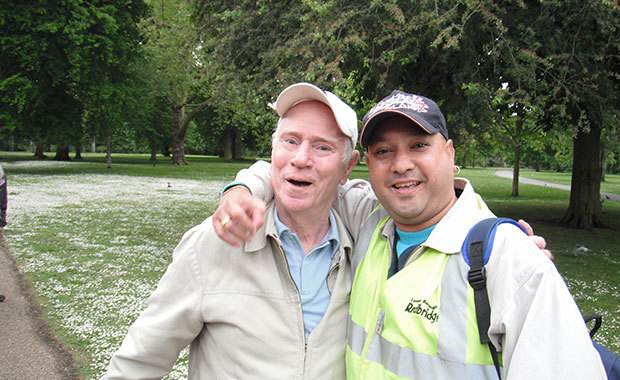
Neil Mapes
CEO of Dementia Adventure
Most of us know someone who has been affected by dementia. Until there is a cure, we need ways of living better with this condition.
It’s important we look at the person and not the disease, value being in the moment with that individual and focus on their perception of reality and not our own.
But do we always consider the importance of connection to the outdoors and the risks of not having regular access to green spaces? In a dementia household everyday activities and pastimes can become harder and overwhelming.
Without the right support and opportunities, social interactions diminish and people become increasingly isolated and spend more time indoors. Yet research shows that getting outside significantly improves wellbeing and the benefits can include improved sleep patterns, appetite, speech, personal relationships, and reduced stress, anxiety and loneliness.
Holidays on the Isle of Wight and sailing a Thames barge on the east coast
“On holidays recently, we had found ourselves feeling increasingly isolated with being faced with new people who are not aware of our circumstances. Brian finds it difficult to talk and to concentrate. He’s easily distracted and has no sense of urgency. He finds choices overwhelming and is a fussy eater. My fears were quickly allayed. We were with people who understood. I could relax and enjoy being looked after too. For weeks after the holiday, I found myself smiling and feeling relaxed. Brian equally seemed to feel the benefits. We had felt normal again and could be hopeful about the future.”
Brian and Rachel
When someone we care for becomes ill we can become highly protective, wanting to ‘wrap them up in cotton wool’ and keep them safe inside. Whilst we never put people in harm’s way, an unhealthy perception of risk can mean individuals miss out on the fun and meaningful opportunities that life has to offer.
Getting outside doesn’t have to involve a big excursion. Research shows that as little as five minutes’ contact with nature and the outdoors has significant emotional benefits for us all.
Most towns and cities have parks or outside green spaces and incidental encounters with people walking dogs or taking children to school, provide normal social experiences that help us feel connected with our communities. Many of us have a garden that we can use, but if physical ability or support to access these places is a barrier, we can always bring the outdoors in. Sitting by an open door or a window overlooking a bird table, cut flowers, objects from nature or even looking through a nature book or magazine, can all bring a sense of connection.

The dementia inclusive park walk at Valentines Park, London Borough of Redbridge and Vision RCL
“One of our service users, Geoff, is living with Parkinson’s and Lewy Body Dementia. He sadly had a minor stroke last month but was adamant about attending the walk with his wife and daughter. Usually a wheelchair user, though able to walk short distances, he walked the entire 40 minute route with the support of his daughter. When we reached the end of the walk Geoff looked like a different person, his colour had come back, his eyes looked brighter and he was able to communicate better. It really was so good to see and very rewarding. A fantastic achievement despite the shock his body had been through so recently.”
The Redbridge Team
The Abbeyfied Society, ‘Breath of Fresh Air’ Programme
“We know the health benefits that can be derived from getting outdoors for people with dementia, their carers and families. Yet many Abbeyfield homes and houses have great gardens which were often underused. We developed the Abbeyfield ‘Breath of Fresh Air’ programme to train staff and volunteers to help residents with dementia explore and enjoy outside activities within a safe environment.”
April Dobson, Abbeyfield Society
“As carers, Abbeyfields’ natural inclination is to protect people and sometimes this can lead to a risk averse culture. Initially some staff and family members were concerned about what might happen if residents went outside more often. Dementia Adventure delivered training and support for staff and family carers focusing on a more balanced approach to risk benefit assessments, planning outside activities, connecting with nature and co-producing solutions to potential barriers. Following an internal evaluation of the pilot, Abbeyfield found that as a result of more time outside:
- Residents who said they were moderately lonely to very lonely fell from 77% to 11%
- The average number of falls reduced by 10%
- Residents exercising once a week or more rose by one third
- Residents having an average of seven or more hours of sleep each night increased from 55% to 88%
- Residents who rated their appetite as good or very good rose from 66% to 100%
- The proportion of residents whose mood was either good or very good doubled from 33% to 66%
Abbeyfield have implemented a hugely effective yet simple programme of outdoor activity which is truly inspiring.”
Neil Mapes, Dementia Adventure
We constantly see the real change that outdoor activity brings into the lives of people with dementia and their carers.
I’d encourage us to think differently about dementia, to take advantage of the amazing natural resources that we have on our doorstep and create opportunities for people to get outdoors, connect with themselves, their loved ones, their community, and retain a sense of adventure in their lives.
Dementia Adventure provide supported dementia holidays, training and consultation to a range of organisations and leads and participates in dementia research. Please visit dementiaadventure.co.uk for more information on how to live better with dementia.


